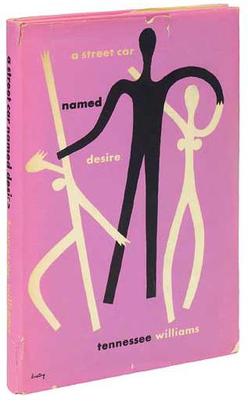
A Streetcar Named Desire is a play written by Tennessee Williams and first performed on Broadway on December 3, 1947. The play dramatizes the experiences of Blanche DuBois, a former Southern belle who, after encountering a series of personal losses, leaves her once-prosperous situation to move into a shabby apartment in New Orleans rented by her younger sister Stella and brother-in-law Stanley.

Brigadoon is a musical with a book and lyrics by Alan Jay Lerner, and music by Frederick Loewe. The song "Almost Like Being in Love", from the musical, has become a standard. It features two American tourists who stumble upon Brigadoon, a mysterious Scottish village that appears for only one day every 100 years. Tommy, one of the tourists, falls in love with Fiona, a young woman from Brigadoon.

Dangerous is a 1935 American drama film directed by Alfred E. Green and starring Bette Davis in her first Oscar-winning role. The screenplay by Laird Doyle is based on his story Hard Luck Dame.

The Star is a 1952 American drama film directed by Stuart Heisler and starring Bette Davis, Sterling Hayden and Natalie Wood. The plot tells the story of an aging, washed-up actress who is desperate to restart her career. Even though the film was a critical and commercial failure, Bette Davis received an Academy Award nomination for Best Actress.

Breakfast of Champions, or Goodbye Blue Monday is a 1973 novel by the American author Kurt Vonnegut. His seventh novel, it is set predominantly in the fictional town of Midland City, Ohio, and focuses on two characters: Dwayne Hoover, a Midland resident, Pontiac dealer and affluent figure in the city, and Kilgore Trout, a widely published but mostly unknown science fiction author. Breakfast of Champions deals with themes of free will, suicide, and race relations, among others. The novel is full of drawings by the author, substituting descriptive language with depictions requiring no translation.

Stanley Kowalski is a fictional character in Tennessee Williams' play A Streetcar Named Desire.

Once Upon a Mattress is a musical comedy with music by Mary Rodgers, lyrics by Marshall Barer, and book by Jay Thompson, Dean Fuller, and Marshall Barer. It opened off-Broadway in May 1959, and then moved to Broadway. The play was written as a humorous adaptation of the 1835 Hans Christian Andersen fairy tale "The Princess and the Pea".
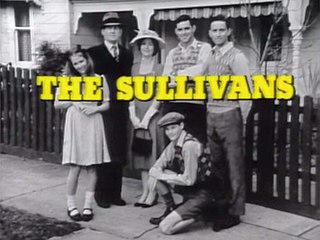
The Sullivans is an Australian period drama television series produced by Crawford Productions which ran on the Nine Network from 15 November 1976 until 10 March 1983. The series tells the story of a fictional average middle-class Melbourne family and the effect that the Second World War and the immediate post-war events had on their lives. It covers the period between 1 September 1939 to 22 August 1948. It was a consistent ratings success in Australia, and also became popular in the United Kingdom, the Republic of Ireland, the Netherlands, Gibraltar, Greece and New Zealand.

Candida, a comedy by playwright George Bernard Shaw, was written in 1894 and first published in 1898, as part of his Plays Pleasant. The central characters are clergyman James Morell, his wife Candida and a youthful poet, Eugene Marchbanks, who tries to win Candida's affections. The play questions Victorian notions of love and marriage, asking what a woman really desires from her husband. The cleric is a Christian Socialist, allowing Shaw to weave political issues, current at the time, into the story.
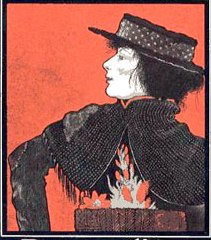
Pygmalion is a play by Irish playwright George Bernard Shaw, named after the Greek mythological figure. It premiered at the Hofburg Theatre in Vienna on 16 October 1913 and was first presented on stage in German. Its English-language premiere took place at His Majesty's Theatre in London's West End in April 1914 and starred Herbert Beerbohm Tree as phonetics professor Henry Higgins and Mrs Patrick Campbell as Cockney flower-girl Eliza Doolittle.
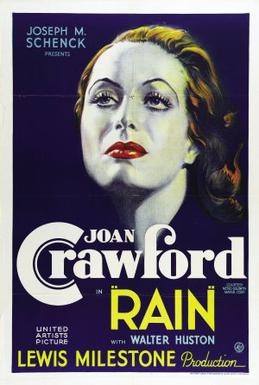
Rain is a 1932 pre-Code drama film that stars Joan Crawford as prostitute Sadie Thompson. Directed by Lewis Milestone and set in the South Seas, the production was filmed in part at Santa Catalina Island and what is now Crystal Cove State Park in California. The film also features Walter Huston in the role of a conflicted missionary who insists that Sadie end her evil ways, but whose own moral standards and self-righteous behavior steadily decay. Crawford was loaned out by MGM to United Artists for this film.

Hayley Rose Smith is a fictional character from the Australian soap opera Home and Away. She was portrayed from September 1998 to September 2005 by actress Rebecca Cartwright and from September to November 2005 by Ella Scott Lynch, after Cartwright left the show for personal reasons.
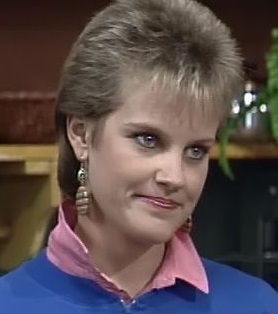
Daphne Clarke is a fictional character from the Australian soap opera Neighbours, played by Elaine Smith. Daphne was created by Reg Watson as one of Neighbours' twelve original characters. The producer had originally wanted Rebecca Gibney to play the role, but she joined the cast of another television series. When Smith came in to audition for a guest part, her appearance, particularly her short haircut, caught the attention of the casting director, who had been looking for an "outrageous image" for the character of Daphne. Smith won the role and she made her on-screen debut in the soap's first episode, which was broadcast on 18 March 1985.
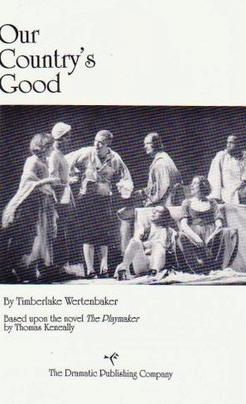
Our Country's Good is a 1988 play written by British playwright Timberlake Wertenbaker, adapted from the Thomas Keneally novel The Playmaker. The story concerns a group of Royal Marines and convicts in a penal colony in New South Wales, in the 1780s, who put on a production of The Recruiting Officer.

Who Am I This Time? is a 1982 American made-for-television comedy-drama film directed by Jonathan Demme and based on the 1961 short story of the same name by Kurt Vonnegut. It is the fourth episode of the first season of PBS' American Playhouse series which aired on February 2, 1982.

Our Blushing Brides is a 1930 American pre-Code society comedy/romantic melodrama directed and produced by Harry Beaumont and starring Joan Crawford, Robert Montgomery, Anita Page and Dorothy Sebastian.

Sins is a 1986 CBS television miniseries starring Joan Collins. An adaptation of the 1982 novel of the same name by Judith Gould, it is the story of a woman who survives the horrors of the Nazi occupation of France and endures a succession of challenges as she rises in the world of fashion.

So This Is Love is a 1953 American musical drama film directed by Gordon Douglas, based on the life of singer Grace Moore. The film stars Kathryn Grayson as Moore, and Merv Griffin. The story chronicles Moore's rise to stardom from 1918 to February 7, 1928 when she made her debut at the Metropolitan Opera.

Valerie Grant is a fictional character from Days of Our Lives, an American soap opera on the NBC network. The character was created by Pat Falken Smith and introduced as the black love interest for white character David Banning. The role was originated by Tina Andrews on October 27, 1975. Andrews was replaced by Rose Fonseca in the summer of 1977. Valerie and her family take David in when he is injured in a car accident and they soon fall in love. David and Valerie become engaged in the summer of 1976 but the romance is plagued by his infidelity, his ex-girlfriend Brooke Hamilton and her mother Helen's unwillingness to accept the relationship. When David's affair with Trish Clayton results in pregnancy, Valerie ends the relationship and takes a scholarship to medical school at Howard University in 1978. Actress Diane Sommerfield took over the role in 1981 when Valerie returns as a medical intern at the hospital. She becomes involved with Abe Carver which is plagued by Val's residual feelings for David and Abe's unwillingness to get married one day. The character is written out in 1982.
















